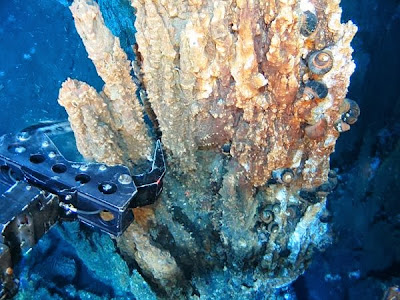By Joe WASIA
Seabed mining, of course, it’s a new term to the ears of many Papua New Guineans. In very simple definition it’s the underwater extraction of minerals resources.
Seabed mining, of course, it’s a new term to the ears of many Papua New Guineans. In very simple definition it’s the underwater extraction of minerals resources.
Now, a new frontier in mining is set to be opened up by the underwater extraction of resources from the seabed off the coast of
Canadian firm Canadian Natalius Minerals has been granted a 20-year licence by the PNG government last year under the Somare regime to commence the Solwara 1 project near East New Britain and New Ireland provinces, which many people refer it as the world's first commercial deep sea mining operation.
This mining process will involve levelling underwater hydrothermal "chimneys", which spew out vast amounts of minerals. Sediment is then piped to a waiting vessel, which will separate the ore from the water before pumping the remaining liquid back to the seafloor. This will be dangerous to the entire marine lives and its ecological system in the
The green light was given by the Somare government last year and it is now confirmed by O’Neil-Deon Government. However, the decisions by these successive governments do not go well with the vast majority of the people of
After observing the objections from different landowner groups, activists, non government organizations, some members of Parliament, and so many people around the country, I conducted a small interview with expatriates at different PNG LNG project sites.
Interview was conducted with expatriates who are already working here and new starters with different contractor companies at the project sites including the client, Exxon Mobil. It took five months to complete the interview.
The question asked was “Have you ever seen a seabed mining
activities in any parts of the world or have any knowledge about the method?”
The question was designed to obtain basic knowledge about the method used and
how familiar it is.
The question was asked since this controversial seabed
mining was tabled which dug out attentions from many NGO’s, landowner groups,
some elected members, and thousands of people around the country.
Two hundred and seventy (270) expatriates were interviewed
of which 246 said they have no idea about the method and have never seen any
seabed mining, whilst 24 of them were able to explain the method but could not
explain it clearly how it works. They even said the method is rarely used.
That shows the proposed PNG’s seabed mining is first of its
kind in almost whole world. From the result obtained from this small interview
I could say the PNG government and its responsible ministries were convinced to
believe and accept what was not practical in many parts of the world.
It is believed that developed countries have treated Papua New Guinea
as guinea pigs to conceptualise what was not practical out there. PNG has been
a playing ground for the big boys.
This seabed mining is just one of the many projects that
were allowed to operate in the country without proper environmental and health
risk assessment being carried out prior to the project.
Other examples are Deep Sea Trailing Disposal (DSTD) by
Chinese Government owned MCC (Management) Limited and Australian owned Marengo
Mining in Madang Province
If you look closely how the licence are issued and permits
are granted to such mining, logging, and other heavy industries in the country
you could see almost all companies never follow the proper processes.
The PNG’s revenue from these industries is much higher which
makes up more than 70% of the total annual revenue. I think the population of
this country is equally proportional to the billions of kina national annual
budgets.
After observing hundreds of exploration companies, mining,
and oil and gas projects already here in PNG I wonder if we have a heart for
the future generations of this country. Mining and petroleum resources that we
see are non renewable and will definitely be exhausted one day.
Why, under successive governments, continue on issuing
licences and permits to so many exploration and mineral project development
companies in the country?
The result from this small interview shows that this country
was taken as a guinea pig to conceptualise what was not used in rest of the
world.
Therefore, I call on the current government, under the leadership
of Hon. Peter O’Neil and his deputy and members of this parliament who are
supporting the seabed mining project to look carefully the whole scenario and reverse
the decision from going further.
Protect the natural beauty of the Bismarck and Coral seas which had sustained
thousands of people in the provinces within and around the seas.


No comments:
Post a Comment